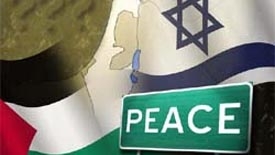A Hopeful Picture in Israel?
Polls and Protests Point to Positive Potential
by Lia Tarachansky
Recent months saw a ruthless barrage of disturbing articles on internal political developments in Israel — articles that shine light on one ugly picture. Those painting the picture, including pundits, journalists, peace activists, and those of us who like to think of ourselves as  anti-racist Israelis, are painting it to be one of a rising tide in racism and state repression. Some in Israel are saying these signs are but a warning, drawing parallels to 1935 Germany or the American south during the Jim Crow era. But as gloomy as the picture seems, new public opinion polls paint a different one. They paint a more hopeful picture, at least of Israel from within.
anti-racist Israelis, are painting it to be one of a rising tide in racism and state repression. Some in Israel are saying these signs are but a warning, drawing parallels to 1935 Germany or the American south during the Jim Crow era. But as gloomy as the picture seems, new public opinion polls paint a different one. They paint a more hopeful picture, at least of Israel from within.
On Friday, thousands of Israelis took to the streets to oppose the rise of anti-democratic moves in Israel. They chanted “Yehudim ve Aravim Mesarvim Lihyot Oyvim,” a chant I heard often in Israel and in the occupied Palestinian territories. It means “Jews and Arabs refuse to be enemies.” Some signs read “Orthodox Jews for Democracy,” an attempt to counteract some of the actions of Orthodox Jewish leaders in recent months.
Perfect examples are such stories as the letter that dozens of state-salaried Rabbis signed, advocating Jews not to rent or sell homes to non-Jews (read: Arabs) and then members of the public vigilante attacking those who did. Stories such the Rabbis’ wives writing an equally racist letter urging Jewish women not to date non-Jewish men, and of course the Jawahr Abu Rahmeh affair last month, or the story of how Palestinian firefighters who fought the devastating fire in the Israeli north were prevented days later from traveling to their own honoring ceremony for so-called “security†reasons.
Black and white incidences like these come at the culmination of a turbulent year for Israeli democracy coupled with the increasing failure of Israeli PR. For example after the Jawahr Abu Rahmeh was killed last month during the weekly protest in Bil’in, the PMO’s Twitter and Facebook messages claimed it wasn’t connected to the IDF’s actions. But the PR attack failed as accurate information quickly emerged, adding to the already growing distrust of the Israeli government’s statements by foreign journalists. Instead, global press reported on thousands of Israelis and Palestinians coming together for her funeral procession, to mourn this obscene loss of life.
So what does that say about Israeli insularism and hope? Well, for one thing, before we go ahead and conclude that new trends such as fascism are taking the country hostage, we have to admit that the stories of such trends aren’t new and it may just be that the trend they seem to illustrate is not a trend at all. They’ve sparked a mass protest in Tel Aviv, but this protest should have taken place years ago. The rise of the right to powerful positions in the all parts of the Israeli government only gave a platform for this protest to happen now. After all, the community where I grew up, in Israel, was Jewish-only. The high-school I went to made dating non-Jews equivalent to social suicide (for you and your family), and marriage outside of one’s faith was and is still illegal. That much hasn’t changed. Ethnic separation was as popular then as it is now and state repression was as brutal (if not more so) than what we see now. What we haven’t seen till now is that repression is happening to Israeli Jews, leading to more and more stories about our old and dirty laundry ending up on international news. And that may not be such a bad thing.
What’s also new are truly joint Israeli-Palestinian initiatives for a just and lasting peace. Grassroots initiatives that bring actual people together to live in communal spaces, to work side by side, to protest together, to be shot at together, to be arrested together (though judged under separate legal systems). It’s true that the current right-wing government is taking this ethnic segregation to a whole new level with dozens of bizarre and racist law amendments, but one survey shows that the public’s opinion isn’t as homogeneous as the news headlines. A joint Israeli-Palestinian project brought the Palestinian Center for Policy and Survey Research in Ramallah and the Hebrew University in Jerusalem together to conduct a sweeping public opinion poll. Writing about what some are calling a wave of intolerance, Prof. Yaacov Shamir on the Israeli side of the wall and Prof. Khalil Shikaki on the Palestinian side say, “Our poll indicates that only minorities of Israelis and of Israeli Jews support these steps. Palestinians however err in their assessment of the Israeli sentiment in this regard and believe that the majority of Israelis support such expressions.â€
Their poll shows that more Jews oppose the Rabbis’ letter than support what it advocates. An article in the Israeli daily Yediot Ahronot shows that 73% of Israelis believe the Rabbis shouldn’t have even issued the letter in the first place, a figure supported by a massive protest days after the letter was released. Also, unlike some European countries, half the Israeli Jewish public actually opposed a ban on burqas while France went ahead and illegalized the religious face cover in October.
 On the political platform the poll is even more encouraging. The vast majority of Israelis polled supported negotiating with HAMAS to end the violence. This statistic is particularly ironic as HAMAS wasn’t even at the table for the recently failed talks in Washington. However, the statistic supports a 2008 Israeli poll that showed that 70% of Israelis supported the release of Marwan Barghouti in exchange for captured Israeli soldier Gilad Shalit. Barghouti, a Fateh politician, was instrumental in the rise of the Second Intifadah ten years ago.
On the political platform the poll is even more encouraging. The vast majority of Israelis polled supported negotiating with HAMAS to end the violence. This statistic is particularly ironic as HAMAS wasn’t even at the table for the recently failed talks in Washington. However, the statistic supports a 2008 Israeli poll that showed that 70% of Israelis supported the release of Marwan Barghouti in exchange for captured Israeli soldier Gilad Shalit. Barghouti, a Fateh politician, was instrumental in the rise of the Second Intifadah ten years ago.
A majority (63%) of Israelis and about half the Palestinians support mutual recognition. “In our poll we also examine periodically Israelis’ and Palestinians’ readiness for a mutual recognition of identity as part of a permanent status agreement and after all issues in the conflict are resolved and a Palestinian State is established.†It’s noteworthy that on the Palestinian side, according to a 2007 poll by the Nablus-based An-Najah University, almost half of those polled actually believed HAMAS’s statements have already de facto recognized Israel. Interestingly, most Israelis supported the whole negotiations package including Jerusalem and refugees, borders, and security arrangements. So the picture isn’t all gloomy, but it’s not all rosy either. While most are against discrimination, a majority of Israeli Jews still support forcing non-Jews seeking citizenship to swear allegiance to a “Jewish and democratic†(as in, not a multi-ethnic) state.
What this picture shows is that the political will is there. The problem is always with trust. In a 2006 An-Najah University poll, 87% of Palestinians said they do not feel safe. The joint poll last month shows a decrease in that number to 75% of the population worrying “that they or a member of their family might be hurt by Israelis or that their land might be confiscated or homes demolished.†Perhaps that is why only half of those polled believed a permanent agreement would lead to peace, though many more supported an end to violence. On the Israeli side, 54% worried that Arabs may harm them or their family in their daily life.
How much can be assessed about a people based on polling? Perhaps about as much as can be assessed from newspaper headlines. Though it’s now popular to claim Israel is facing some imminent fork in the road, the truth is that the fork has been there for a very long time, and without serious pressure to end the occupation will continue to hover before us, perpetuating our permanent state of war. The bottom line is that even if that fork leads to a road being chosen, the action itself is not all that important. Little will change on the ground as a result of leaders declaring one solution or another, deciding to keep troops at the checkpoints or moving them to the West Bank’s borders. What matters is how we’re going to live together until then and after then, when the photo-ops and Nobel Peace Prizes come and go. How are we going to build trust?
Lia Tarachansky is the Middle East correspondent for The Real News Network and the Director of Seven Deadly Myths, an upcoming documentary about denial and dispossession in Israel. Her work can be seen at www.liatarachansky.com.

It is very heartening to see the results of the recent poll, though I was not surprised because previous polls showed similar views. Surprising is only that this poll shows that the more generous views of Israelis and Palestinians have not changed for the worse. But what the polls also show, it seems to me, is the the dysfunctional nature of Israeli governance, which seems incapable of reflecting the more generous views of its people. This problem is not peculiar to Israel, but the trend in Israeli governance is clearly to move in the opposite direction from the views of its people, and that is not at all a “hopeful picture.”
1A Hopeful Picture in Israel? http://t.co/xmdjBTh
2